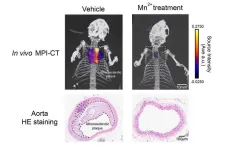(Press-News.org) Orlando, Fla - If you’ve ever seen a movie or TV show in which a character has a seizure, you probably have a fairly standard mental picture of someone falling to the ground in full body convulsions while foaming at the mouth. But that doesn’t necessarily reflect reality. A new national survey by Orlando Health finds that while most Americans recognize those classic symptoms of what’s called a generalized tonic-clonic seizure, the majority fail to recognize the subtle signs, all of which can be dangerous and have a profound impact on the lives of those suffering from them.
“Anything that interrupts your brain’s circuit can cause seizures, from tumors, infections and strokes to high or low blood sugar or glucose levels to inherited genetic features. And different types of seizures can present with dozens of different symptoms,” said Dipali Nemade, MD, MPH, an epileptologist and neurologist at the Orlando Health Neuroscience Institute. “But because they often look different than those ‘cinematic seizures’ we see in movies and television, they can go undiagnosed for a long time.”
The survey, conducted by Ipsos, found less than half of Americans believe numbness or tingling (32%), blinking rapidly (35%), crying out or screaming (13%) and laughing (6%) are signs of a seizure, but Dr. Nemade says it’s important to pay attention to any odd or out-of-place behaviors and address them with your doctor.
“Even seizures with these less dramatic symptoms can make everyday activities like driving and cooking dangerous. For some people, their seizures present outwardly with very subtle signs like smacking their lips, picking at their clothes or just staring into space, and it’s important to recognize when you or someone around you is experiencing them so they can be accurately diagnosed and treated,” Dr. Nemade said. “By looking at their brainwaves (EEG), we can see if those behaviors are being caused by seizures.”
For Mike Sail, seizures start with a flushed feeling that travels from his abdomen to his throat, followed by raised arm hair causing his condition to initially be misdiagnosed as acid reflux. It wasn’t until he lost his memory of an entire week that he was finally referred to Dr. Nemade, who diagnosed his condition as epilepsy.
“I kept saying that it can’t be acid reflux because that doesn't cause the hair on your arms to stick up,” Sail said. “For the most part, these episodes were not very disruptive. They only lasted a minute or two and usually only happened once every few weeks. Sometimes I’d have them while I was doing things like playing golf, and afterwards I would just go about my business. So, I was shocked to find out they were seizures because it wasn’t what most people think a seizure looks like.”
Like most cases, Sail’s epilepsy is well-controlled with anti-seizure medication, lifestyle changes and adequate sleep, and he no longer fears that uneasy feeling he gets before having what he now knows were seizures. Dr. Nemade says education is needed to help others like Sail raise a red flag when they’re having unexplained symptoms on a regular basis.
“If people don’t know that these symptoms can be caused by epileptic seizures, their condition will be misdiagnosed or ignored and it will continue to affect their quality of life. That can be very isolating and frustrating, which is why many people with uncontrolled epilepsy experience anxiety and depression,” Dr. Nemade said. “Too many people never go to the doctor because they don’t feel like it is profoundly affecting their lives, or they don’t know how to explain what they’re feeling.”
For rare cases of epilepsy that are resistant to anti-seizure medication, there are some advanced treatments that Dr. Nemade and her team offer at the Orlando Health Neuroscience Institute’s epilepsy center, such as intracranial monitoring (sEEG/subdural) and mapping the brain to find the exact spot where seizures are originating and removing a small piece of tissue. If they are not able to remove the tissues safely, then neuromodulation options like responsive neurostimulation, deep brain stimulation and vagus nerve stimulation are effective palliative options. It’s effective treatments like these that are not only improving lives, but also saving them by preventing sudden unexpected death in epilepsy, or SUDEP, which claims about 3,000 lives in the U.S. each year. But Dr. Nemade says they can only help if symptoms are recognized and action is taken.
If you suspect someone is experiencing a seizure, sit them down in a safe place without any sharp or heavy objects in their surroundings and ensure they can breathe freely until symptoms subside. If a seizure lasts more than five minutes, call 911. Those who have never received an epilepsy diagnosis or another explanation for their seizure should follow up with their doctor or a neurologist.
Survey method
Editor’s note:
This survey was conducted online within the United States by Ipsos on the KnowledgePanel® from October 5 to October 8, 2023, and surveyed 1,024 U.S. adults ages 18 and older. This poll is based on a nationally representative probability sample and has margin of sampling error of plus or minus 3.3 percentage points at the 95% confidence level, for results based on the entire sample of adults. For complete survey methodology, including weighting variables and subgroup sample sizes, please contact: christopher.moessner@ipsos.com.
About Orlando Health
Orlando Health, headquartered in Orlando, Florida, is a not-for-profit healthcare organization with $9.2 billion of assets under management that serves the southeastern United States and Puerto Rico.
Founded more than 100 years ago, the healthcare system is recognized around the world for Central Florida’s only pediatric and adult Level I Trauma program as well as the only state-accredited Level II Adult Trauma Center in Pinellas County. It is the home of the nation’s largest neonatal intensive care unit under one roof, the only system in the southeast to offer open fetal surgery to repair the most severe forms of spina bifida, the site of an Olympic athlete training facility and operator of one of the largest and highest performing clinically integrated networks in the region. Orlando Health has pioneered life-changing medical research and its Graduate Medical Education program hosts more than 350 residents and fellows.
The 3,888-bed system includes 29 hospitals and emergency departments – 24 of which are currently operational with five coming soon. The system also includes nine specialty institutes, more than 100 adult and pediatric primary care practices, skilled nursing facilities, an in-patient behavioral health facility under the management of Acadia Healthcare, and more than 60 outpatient facilities that include imaging and laboratory services, wound care centers, home healthcare services in partnership with LHC Group, and urgent care centers in partnership with FastMed Urgent Care. More than 4,750 physicians, representing more than 100 medical specialties and subspecialties have privileges across the Orlando Health system, which employs more than 27,000 team members and more than 1,200 physicians.
In FY22, Orlando Health served nearly 142,000 inpatients and 3.9 million outpatients. The healthcare system provided more than $782 million in total value to the communities it serves in the form of charity care, community benefit programs and services, community building activities and more in FY 21, the most recent period for which this information is available. Additional information can be found at http://www.orlandohealth.com, or follow us on LinkedIn, Facebook, Instagram and Twitter @orlandohealth.
END
Survey finds most Americans are unaware of many signs that someone is having a seizure
Seizures don’t always look how they’re portrayed in movies, and knowing the more subtle signs like laughing or lip-smacking behavior may lead to diagnosis and effective treatment for epilepsy
2023-11-02
ELSE PRESS RELEASES FROM THIS DATE:
A “manganese bullet” targeting the top killer?
2023-11-02
Cardiovascular diseases (CVDs) continue to rank as the top killer in the modern world. This deadly disorder often starts with the buildup of lipid deposits or plaques within the blood vessel, silently setting the stage for atherosclerosis. Rupture of these atherosclerotic plaques, however, could clot blood vessels and lead to life-threatening conditions including heart attack or stroke.
Dyslipidemia, meaning having too much “bad” or atherogenic lipids in the blood, represents the most common cause of CVDs and ...
New NUS study provides insights into early breast cancer development in individuals with BRCA2 mutations
2023-11-02
A pioneering study led by Professor Ashok Venkitaraman from the Cancer Science Institute of Singapore (CSI Singapore) at the National University of Singapore and Dr Mona Shehata from the University of Cambridge (UK) has uncovered vital insights into the distinct effects of BRCA2 mutations on breast tissue cells, shedding light on early breast cancer development in people with BRCA2 mutations. The research was published in the prestigious journal Nature Communications on 25 August 2023.
Breast cancer is a serious concern for individuals with BRCA2 mutations, ...
Clinical intervention directed at social risks does not increase experiences of discrimination
2023-11-02
A growing recognition of the health impact of social risks – such as food insecurity and homelessness – has prompted researchers, healthcare providers and policymakers to consider ways to address these risk factors as part of holistic clinical care. However, some healthcare providers worry the same interventions designed to help patients and families with social risks might also make them feel singled out or like they are otherwise stigmatized.
Now, new results of a rigorous study from the University of Chicago Medicine published October 2023 in JAMA Pediatrics suggest well-designed interventions that address social risks can be provided ...
$13M NIH grant funds research aimed at revitalizing immune systems of older adults
2023-11-02
University of Arizona Health Sciences researchers received a $13.1 million grant from the National Institute on Aging to continue studies aimed at rejuvenating the immune system of older people in order to improve health throughout the lifespan.
Older adults are disproportionally affected by infection, cancer and certain types of autoimmune disease. This is influenced by the fact that as a person ages, their body produces fewer T cells and gets less proficient at maintaining them. T cells are a type of white blood cell essential to the immune ...
Study provides preliminary evidence in favor of a new type 1 diabetes treatment
2023-11-02
Type 1 diabetes is an autoimmune disease that causes the body's immune system to attack and destroy insulin-producing beta cells in the pancreas. Traditional management of type 1 diabetes has primarily involved replacing the missing insulin with injections which, though effective, can be expensive and burdensome. A new study led by researchers at the University of Chicago Medicine and Indiana University suggests that an existing drug could be repurposed to treat type 1 diabetes, potentially reducing dependence on insulin as the sole treatment.
The research centers on a medication known as α-difluoromethylornithine (DFMO), which inhibits an enzyme that plays a key role in cellular ...
New branch of oncology, cancer neuroscience, offers hope for hard-to-treat brain tumors
2023-11-02
Cancer cells hijack normal biological processes, allowing them to multiply. For example, tumors spur construction of new blood vessels, building themselves “highways” to supply nutrients.
Researchers have known about cancer’s blood vessel infiltration for decades, but it was only in the past few years that Stanford Medicine scientists and their colleagues discovered that tumors don’t just tap the body’s highway system; they can also infiltrate and exploit its “telecommunications.”
To ...
Less physical activity in adolescence likely rooted in biology
2023-11-02
AURORA, Colo. (Nov. 1, 2023) – The slowdown of physical activity during adolescence is not likely caused by lifestyle and environment but by energy demands placed on the body as it grows and sexually matures, according to a new study by researchers at the University of Colorado Anschutz Medical Campus.
The study, published today in the Proceedings of the Royal Society B, examined the lifestyles of the physically active Tsimane people, an indigenous population of forager-horticulturalists in lowland Bolivia, to see similarities and differences to adolescents living in post-industrialized nations.
“We wanted to look at the role of environment and the role of biology,” ...
Adult coral can handle more heat and keep growing thanks to heat-evolved symbionts
2023-11-02
Adult fragments of a coral species can better tolerate bleaching and recover faster when treated with tougher heat-evolved symbionts, new research from the Australian Institute of Marine Science (AIMS) and the University of Melbourne indicates.
The study also found that treatment with the heat-evolved symbionts did not compromise the coral’s ability to grow. This differs from previous studies on Great Barrier Reef corals which found that naturally heat tolerant symbionts could enhance heat resistance in adult corals, but at a cost to its growth.
Symbionts are the tiny cells of algae that live inside the coral tissue, providing corals with energy to grow. The survival ...
Stronger, stretchier, self-healing plastic
2023-11-02
An innovative plastic, stronger and stretchier than the current standard type and which can be healed with heat, remembers its shape and partially biodegradable, has been developed by researchers at the University of Tokyo. They created it by adding the molecule polyrotaxane to an epoxy resin vitrimer, a type of plastic. Named VPR, the material can hold its form and has strong internal chemical bonds at low temperatures. However, at temperatures above 150 degrees Celsius, those bonds recombine and the material can be reformed into different shapes. Applying heat and a solvent breaks VPR down into its raw components. Submerging it in seawater ...
Brain health in over 50s deteriorated more rapidly during the pandemic
2023-11-02
rain health in over 50s deteriorated more rapidly during the pandemic, even if they didn’t have COVID-19, according to major new research linking the pandemic to sustained cognitive decline.
Researchers looked at results from computerised brain function tests from more than 3,000 participants of the online PROTECT study, who were aged between 50 and 90 and based in the UK. The remote study, led by teams at the University of Exeter and the Institute of Psychiatry, Psychology & Neuroscience (IoPPN) at King’s ...
LAST 30 PRESS RELEASES:
University of Oklahoma researchers develop durable hybrid materials for faster radiation detection
Medicaid disenrollment spikes at age 19, study finds
Turning agricultural waste into advanced materials: Review highlights how torrefaction could power a sustainable carbon future
New study warns emerging pollutants in livestock and aquaculture waste may threaten ecosystems and public health
Integrated rice–aquatic farming systems may hold the key to smarter nitrogen use and lower agricultural emissions
Hope for global banana farming in genetic discovery
Mirror image pheromones help beetles swipe right
Prenatal lead exposure related to worse cognitive function in adults
Research alert: Understanding substance use across the full spectrum of sexual identity
Pekingese, Shih Tzu and Staffordshire Bull Terrier among twelve dog breeds at risk of serious breathing condition
Selected dog breeds with most breathing trouble identified in new study
Interplay of class and gender may influence social judgments differently between cultures
Pollen counts can be predicted by machine learning models using meteorological data with more than 80% accuracy even a week ahead, for both grass and birch tree pollen, which could be key in effective
Rewriting our understanding of early hominin dispersal to Eurasia
Rising simultaneous wildfire risk compromises international firefighting efforts
Honey bee "dance floors" can be accurately located with a new method, mapping where in the hive forager bees perform waggle dances to signal the location of pollen and nectar for their nestmates
Exercise and nutritional drinks can reduce the need for care in dementia
Michelson Medical Research Foundation awards $750,000 to rising immunology leaders
SfN announces Early Career Policy Ambassadors Class of 2026
Spiritual practices strongly associated with reduced risk for hazardous alcohol and drug use
Novel vaccine protects against C. diff disease and recurrence
An “electrical” circadian clock balances growth between shoots and roots
Largest study of rare skin cancer in Mexican patients shows its more complex than previously thought
Colonists dredged away Sydney’s natural oyster reefs. Now science knows how best to restore them.
Joint and independent associations of gestational diabetes and depression with childhood obesity
Spirituality and harmful or hazardous alcohol and other drug use
New plastic material could solve energy storage challenge, researchers report
Mapping protein production in brain cells yields new insights for brain disease
Exposing a hidden anchor for HIV replication
Can Europe be climate-neutral by 2050? New monitor tracks the pace of the energy transition
[Press-News.org] Survey finds most Americans are unaware of many signs that someone is having a seizureSeizures don’t always look how they’re portrayed in movies, and knowing the more subtle signs like laughing or lip-smacking behavior may lead to diagnosis and effective treatment for epilepsy


